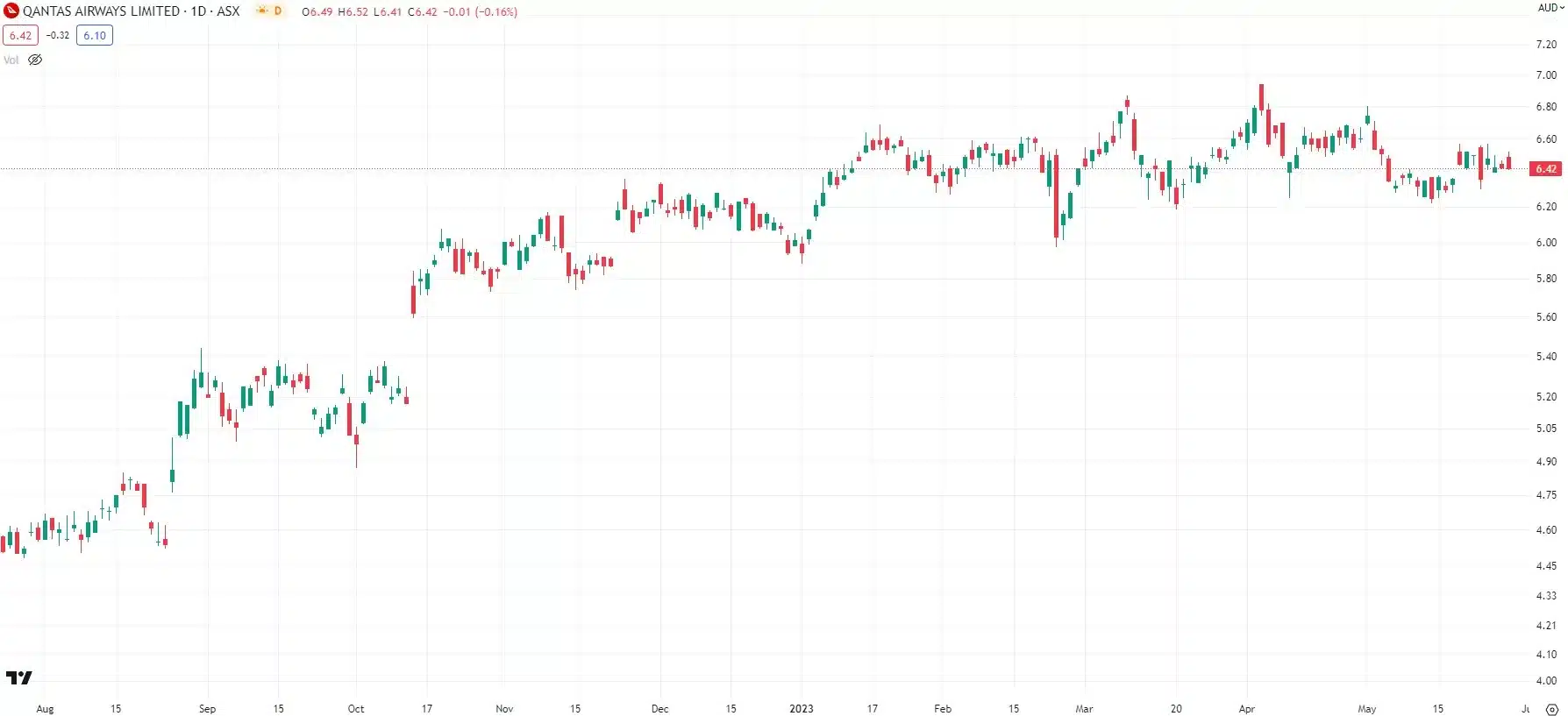Should you buy Qantas shares? Here are 5 reasons why the company thinks you should
![]() Nick Sundich, May 31, 2023
Nick Sundich, May 31, 2023
Should you buy Qantas shares? On one hand, there’s the common mantra that investors should never buy airlines, not to mention that the travel boom has little more room to grow and the share price is near pre-COVID highs.
But the Red Roo begs to differ. You see, the company held its first investor day since the pandemic and outlined several reasons why investors should consider it.
Yes, there’s the usual disclaimer that the presentation alone is not an offer document to buy securities. However, the intention of any company in holding an investor day is to put forward its case to investors. And there were some compelling arguments.
Do you need solid trading & investment ideas on the ASX? Stocks Down Under Concierge can help!
Concierge is a service that gives you timely BUY and SELL alerts on ASX-listed stocks – with price targets, buy ranges, stop loss levels and Sell alerts too. We only send out alerts on very high conviction stocks following substantial due diligence and our stop loss recommendations limit downside risks to individual stocks and maximise total returns.
Concierge is outperforming the market by a significant margin!
GET A 3-MONTH FREE TRIAL TO CONCIERGE TODAY
Should you buy Qantas shares? The 5 reasons proposed by the company:
1. The affluence of its customer base
Obviously, Qantas believes travel demand will keep up. But particularly in respect of its own customers. It told its current and potential investors that its frequent flyers will prioritise travel spending over other categories – such as homewares, alcohol, beauty and clothing.
It also told investors that a high proportion of its tiered frequent flyers (Silver and Above) were of high affluence. 52% were high and another 42% were medium affluence. Granted, this was based on banking transaction data and instead of using income levels. It used a CommBank iQ measurement based on purchasing preferences.
It has 80% of the domestic corporate travel market and over 50% of the SME market.
2. Structural changes have worked to the company’s benefit
The pandemic was a huge hit to airlines globally. The ICAO estimates the impact was US$870bn to all airlines globally – measured by a loss of operating revenue that otherwise would have been achieved. And the impacts continue to hit the industry with ongoing supply chain and labour shortages, increased eCommerce and flexible working.
But Qantas says it is in a better position through the actions it took during the pandemic. It raised $4.8bn in debt and equity in 2020, generated a further $1bn in restructuring benefits and another $800m through a sale of surplus land. It was able to secure long-term fleet renewal orders at prices it otherwise wouldn’t have been able to retain, launched new routes and captured growth in the freight market.

Qantas (ASX:QAN) share price chart, log scale (Source: TradingView)
3. New profitable routes
Qantas Domestic has long been profitable and the group anticipates this improving as the fleet is renewed over the next decade from 737s to A220s and A321XLRs. It told shareholders it was targeting an ~~18% EBIT margin from Qantas Domestic in FY24 and a ~15% EBIT margin for Jetstar domestic.
Qantas International has lagged for years with a 6% EBIT margin pre-COVID, but is targeting 10-12% in the long-term. It is hoping to achieve this through new aircraft that make new profitable routes possible. It noted the example of the 787s that have taken Australia-London from a loss-making route to a profitable one through increased capability and a more premium cabin mix. Other routes made possible, such as Perth-Rome and Melbourne-Dallas, have been profitable too.
And the arrival of the A350 for Project Sunrise is anticipated to take it to the next level with non-stop flights from Australia to London and New York. Qantas is expecting incremental earnings in excess of ~$400m by FY30 as a result of the A350.
But even smaller aircraft, the A321XLR and A220 will play a part too, making routes possible between Australia and Asia that otherwise might not have been financially feasible.
4. Qantas Freight
During the pandemic, the Qantas Freight division boomed due to the growth in eCommerce. But Qantas thinks it still has some way to grow.
Qantas anticipates $1.4bn in revenue in FY23, representing $150m in structural earnings growth from FY19. This is now just because of the growth in online shopping (from 11% penetration to 20% virtually overnight), but digitisation of systems that transform the customer offering and a renewal of the fleet with A321s (and eventually A330s) that offer a greater payload, a greater range and lower emissions.
Another $100m in earnings is targeted in FY30 as eCommerce penetration grows and a curfew-free freight terminal at Western Sydney Airport opens.
5. Qantas Loyalty
The Qantas Loyalty Division consists of the frequent flyer program, with 15m members, and the ecosystem. Qantas earns revenue for being paid for the points it distributes to its members. It told investors that >35% of credit card spend in Australia earns Qantas points and it expects $500-$600m earnings in FY24.
The company told investors that there was more growth to come as it increased redemption opportunities, improved operating efficiency through CX improvements and growth in the membership base. This would have a ‘flywheel effect’ – a virtuous cycle when a business creates positive customer experiences, leading to increased sales and customer loyalty
Sounds good! But…
…the company needs further capital to fund its fleet renewal ambitions – even aircraft that it has signed binding deals to purchase. And there could be further needed with the A330 replacement. There was some speculation that this would be confirmed at the Investor Day, but will now likely be deferred for at least 6 months until Vanessa Hudson takes the hot seat.
Qantas is a safer airline share than plenty of other around the world. But ask us ‘should you buy Qantas shares’ and we would only answer yes if you were comfortable with this uncertainty for the time being.
Stocks Down Under Concierge is here to help you pick winning stocks!
The team at Stocks Down Under have been in the markets since the mid-90s and we have gone through many ups and downs. We have written about every sector!
Our Concierge BUY and SELL service picks the best stocks on ASX. We won’t just tell you what to buy – we give you a buy range, price target and stop loss level in order to maximise total returns. And we will only recommend very high conviction stocks where substantial due diligence has been conducted.
Our performance is well ahead of the ASX200 and All Ords.
You can try out Concierge for 3 months … for FREE.
GET A 3-MONTH FREE TRIAL TO CONCIERGE TODAY
There’s no credit card needed – the trial expires automatically.

Blog Categories
Get Our Top 5 ASX Stocks for FY25
Recent Posts
Your invitation to the Freelancer Investor Day
Your invitation to the Freelancer Investor Day Freelancer (ASX: FLN) is a Sydney-based company that has been the subject of…
Kamala Harris stocks: If Joe Biden’s VP wins the White House in 2024, which stocks will win?
With the US Presidential election now certain to be a Kamala Harris v Donald Trump showdown, we’ve looked at so-called…
South32 (ASX:S32): Is it the dark horse amongst ASX 200 miners or have cyclones and commodity prices hit it too hard?
South32 (ASX:S32) began life as a spinoff from BHP back in 2015, capitalised at $9bn. In mid-2024, it is capped…


